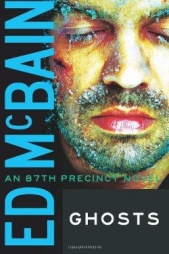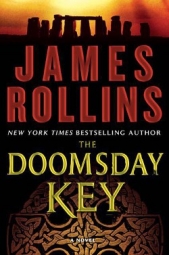Ghosts

Ghosts читать книгу онлайн
It’s Christmastime and Detective Carella gets assigned three murders — including a bestselling author of ghost stories — and is soon after ghosts, mediums, and a crazed killer.
Внимание! Книга может содержать контент только для совершеннолетних. Для несовершеннолетних чтение данного контента СТРОГО ЗАПРЕЩЕНО! Если в книге присутствует наличие пропаганды ЛГБТ и другого, запрещенного контента - просьба написать на почту [email protected] для удаления материала
The Common, such as it was, consisted of a sere rectangle of untended lawn surrounded by the town’s municipal buildings and a four-story brick hotel that called itself the Hampstead Arms. The tawdry tinsel of the season encompassed the square like a squadron of dancing girls in sequins and spangles. An unlighted Christmas tree was in the center of the Common, looking rather like a sodden seagull that had lost its bearings. Carella parked the car, and together he and Hillary walked to the Town Hall, where he hoped to find the Coroner’s Office and the records pertaining to the death of Gregory Craig’s former wife. Hillary was wearing a bulky raccoon coat, a brown woolen hat pulled down over her ears, brown gloves, brown boots, and the same outfit she’d been wearing in her sister’s apartment that morning: a tweedy beige skirt flecked with threads of green and brown, a turtleneck the color of bitter chocolate, and a green cardigan sweater with leather buttons. Carella was wearing much of the finery that had been given to him two days earlier: a pair of dark gray flannel slacks from Fanny, a red plaid flannel shirt from April, a tweed sports jacket the color of smoked herring from Teddy, a dark blue car coat with a fleece lining and a fake fur collar, also from Teddy, and a pair of fur-lined gloves from Mark. His feet were cold; he had put on loafers this morning, not expecting to be trodding the streets of an oceanfront town in Massachusetts, where the temperature lurked somewhat just above zero and the wind came in off the Atlantic like the revenge of every seaman ever lost in those dark waters offshore. As they crossed the Common, Hillary nodded and said, “Yes, I knew it would look like this.”
Hampstead’s Town Hall was a white clapboard building with a gray shingled roof. It faced westward, away from the ocean, shielding the sidewalk outside from the fierce Atlantic blasts. All the lights were on in defense against the afternoon gloom; they beckoned like beacons to lost mariners. Inside, the building was as toasty warm as a general store with a potbellied stove. Carella studied the information board in the lobby, a black rectangle with white plastic letters and numbers on it, announcing the various departments and the rooms in which they might be found. There was no listing for a Coroner’s Office. He settled for the Town Clerk’s Office and spoke there to a woman who sounded a lot like the late President Kennedy. She told him that the Coroner’s Office was located in Hampstead General Hospital, which was about two miles to the northeast, just the other side of the Bight. Reluctant to face the frozen waste yet another time, Carella nonetheless walked with Hillary to where he’d parked the car and then drove due north along an oceanfront road that curved past what appeared to be a large saltwater pond, but that was identified by a roadside sign as HAMPSTEAD BIGHT.
“That’s where she drowned,” Hillary said. “Stop the car.”
“No,” Carella said. “First let’s find out how she drowned.”
The coroner was a man in his late sixties, as pale and as thin as a cadaver, with a fringe of graying hair around his flaking bald pate. He was wearing a threadbare brown sweater, rumpled brown slacks, a white shirt with a frayed collar, and a tie the color of cow dung. His desk was cluttered with a sheaf of loosely scattered file folders and a black plastic sign that announced his name in white letters: MR. HIRAM HOLLISTER. Carella spoke to him alone; it was one thing to bring your medium with you when you went calling on ghosts; it was quite another to conduct official business in the presence of a startlingly beautiful twenty-two-year-old wearing a raccoon coat that made her look cozily cuddlesome. Hillary waited on a bench in the corridor outside.
“I’m investigating three possibly linked homicides in Isola,” Carella said, showing his shield. “One of the victims was a man named Gregory Craig, who—”
“What’s that say there?” Hollister asked, peering at the gold shield with its blue enameling and its embossed city seal.
“Detective,” Carella said.
“Oh, detective, yup,” Hollister said.
“One of the victims was a man named Gregory Craig. His former wife, Stephanie Craig, drowned in Hampstead Bight three summers ago. Your office concluded that the death was accidental. I wonder if I might—”
“Three summers ago, yup,” Hollister said.
“Do you remember the case?”
“No, but I remember three summers ago, all right. That was the year we got all that rain.”
“Would you have a record of what happened? I’m assuming there was an inquest…”
“Oh, yes, there woulda been in a drowning.”
“Stephanie Craig,” Carella said. “Does that name mean anything to you?”
“Not offhand. We get tourists here, you know, they don’t know how tricky the currents can be. We get our share of drownings, I’ll tell you, same as any other coastal community.”
“How about Gregory Craig?”
“Don’t recollect him either.”
“He wrote a book called Deadly Shades.”
“Haven’t read it.”
“About a house in this town.”
“Nope, don’t know it.”
Carella thought briefly about the illusiveness of fame. Behind his desk Hollister was nodding as though he had suddenly remembered something he had not earlier revealed.
“Yup,” he said.
Carella waited.
“Lots of rain that summer. Washed away the dock outside Logan’s Pier.”
“Mr. Hollister,” Carella said, “where would I find a record of the inquest?”
“Right down the hall,” Hollister said, and looked at his watch. “But it’s getting on three o’clock, and I want to start home before the storm hits. Supposed to be getting at least six inches, did you know that?”
“No, I didn’t,” Carella said, and looked at his own watch. “If you’ll pull the folder for me,” he said, “I can take a look at it and then leave it on your desk, if that would be all right with you.”
“Well,” Hollister said.
“I can sign a receipt for it in my official capacity as—”
“Nope, don’t need a receipt,” Hollister said. “Just don’t want it getting all messed up and out of place.”
“I’ll be very careful with it,” Carella said.
“Get out-of-state police in here every so often,” Hollister said, “they don’t know about neatness and orderliness.”
“I can understand that, sir,” Carella said, figuring a “sir” wouldn’t hurt at this uneasy juncture. “But I’m used to handling files, and I promise I’ll return the folder in exactly the condition I receive it. Sir,” he added.
“Suppose it’d be all right,” Hollister said, and eased himself out of his swivel chair, surprising Carella with a six-foot-four frame that should have belonged to a basketball player. He followed Hollister down the corridor, past Hillary, who sat on the bench and looked up at him inquiringly, and then into an office succinctly marked records on the frosted glass panel of its door. The office was lined with dusty wooden file cabinets that would have fetched handsome prices in any of Isola’s antique shops.
“How do you spell that last name?” Hollister asked.
“C-R-A-I-G,” Carella said, and thought again about fame, and wondered if somewhere in America there was at this very moment someone asking how you spelled Hemingway or Faulkner or even Harold Robbins.
“C-R-A-I-G,” Hollister said, and then went to one of the file cabinets, and opened the drawer, and kept spelling the name over and over to himself as he leafed through the folders.
“Stephanie?” he asked.
“Stephanie,” Carella said.
“Here it is,” Hollister said, and yanked out an inch-thick folder, and studied the name on it again before handing it to Carella. “Just put it here on top of the cabinet when you’re through with it. I don’t want you trying to file it again, hear?”
“Yes, sir,” Carella said.
“Mess up the files that way,” Hollister said.
“Yes, sir.”
“You can use the desk over there near the windows if you like, take off your coat, make yourself comfortable. Who’s that lady outside looks like a grizzly bear?”
























